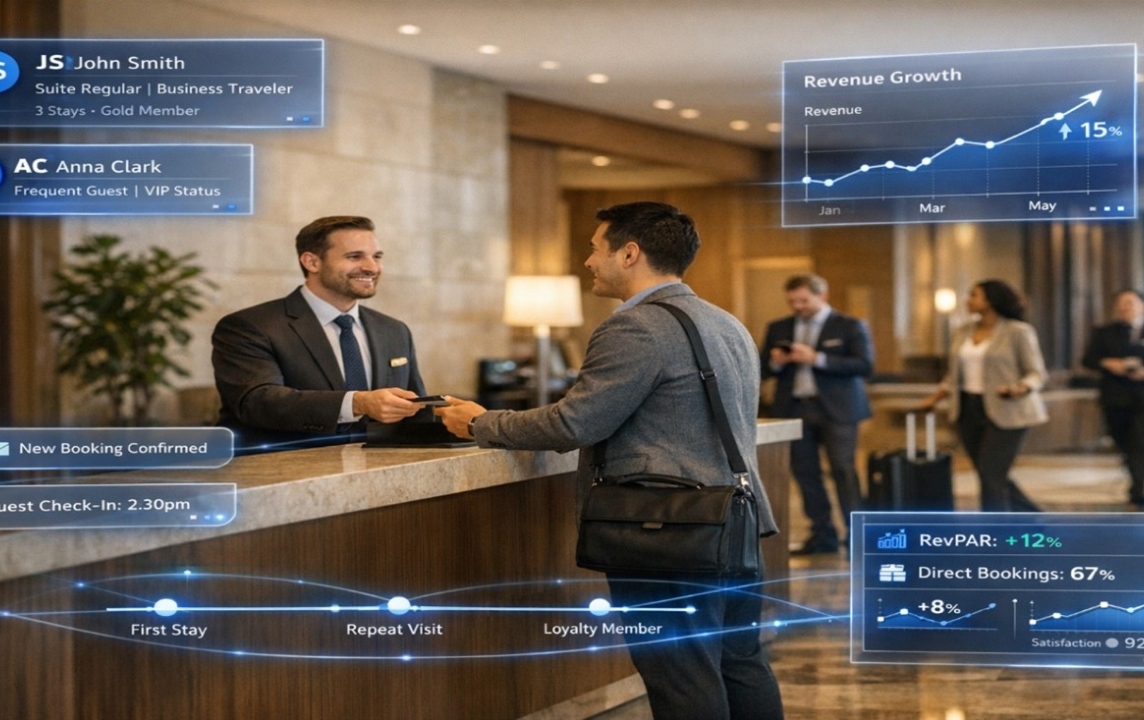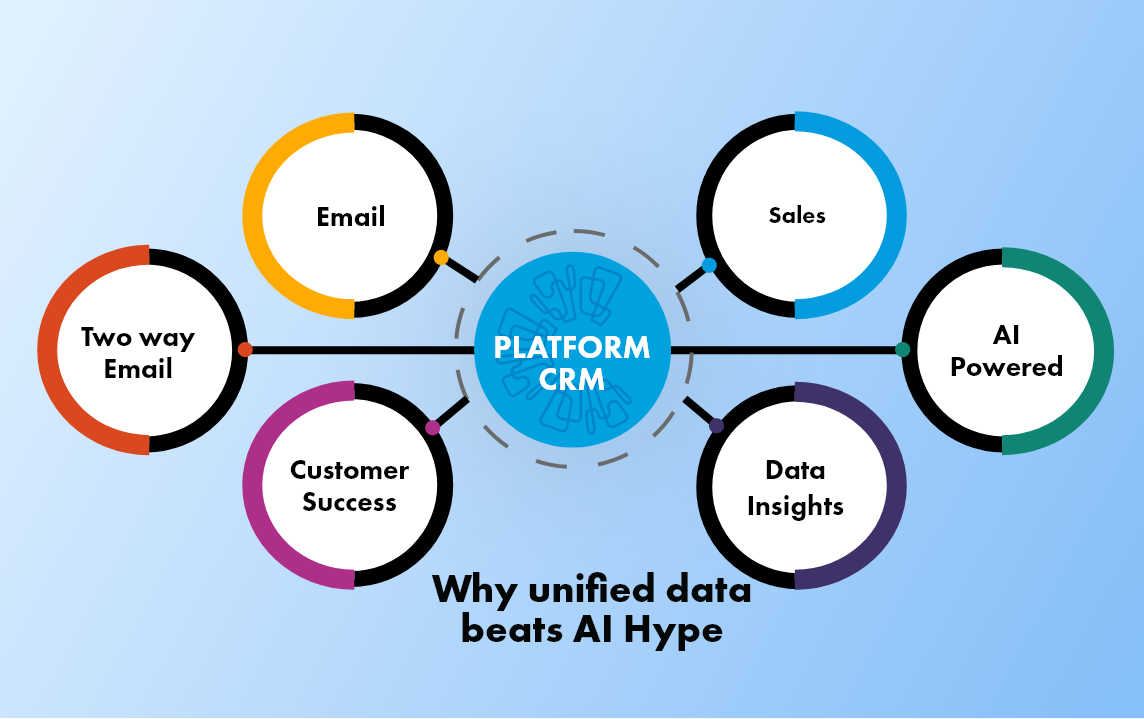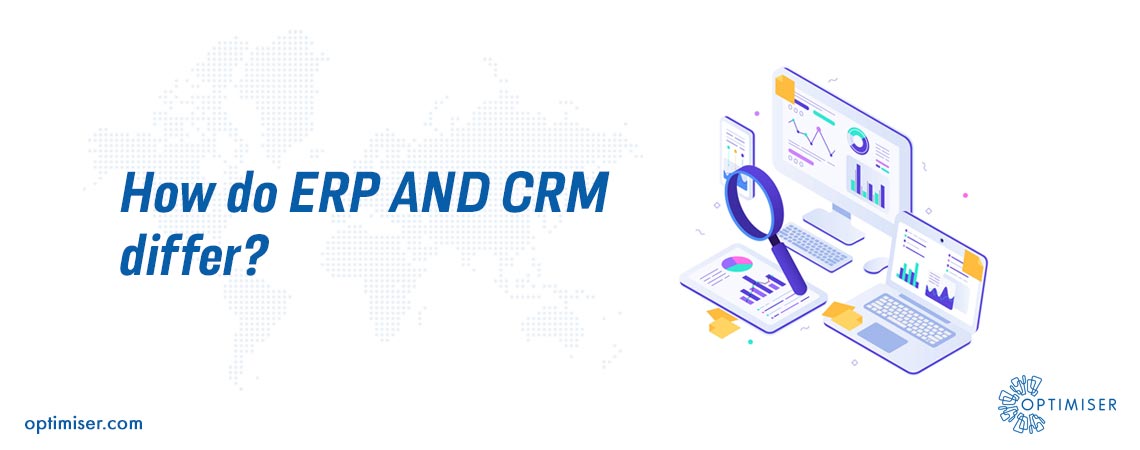
CRM
What is the difference between ERP Software and CRM?
ERP and CRM are used by several organisations. But many tend to get confused between the choices and are not able to choose. While each has its own benefits, it might not be the best fit for your business if you do not know what to focus on. The article lays into the difference between the two to help you narrow down between this operational software that is gaining speed within the industry.
What is Enterprise Resource Planning (ERP)?
Enterprise Resource Planning or ERP works to streamline business processes and allows you to track orders, revenue generated, and transactions made.
Organising and managing your business from supply chain management to financial data tracking, Enterprise Resource Planning aids you in running your business like clockwork.
The main reason why ERP is sought by many is its efficiency in cost reduction, smoothening the business transactions and even significantly improving the performance metrics.
Why Opt for ERP?
1: Save All your data for Sales and Marketing in one place
Similarly, like magazines that came with Yellow Pages that held all the necessary information for home and other issues, ERP is like that. Only for business management which lets you consolidate business processes like manufacturing, accounting, supply, HR, warehouse management, distribution of products to outlets, order fulfilment and more into a single system.
2: Financial health determination
With the help of ERP, all of your cash management is stored in one place. Including debits, credits, loans, cash flows and more. Based on that, you can determine the financial health of your organisation. This, in turn, enables you to structure your cash flow, increase revenue and reduce costs.
3: Production Process Tracking
Companies that have a stringent structure that includes monitoring product development, production process, assembling, testing and managing the workflow within the organisation will find ERP extremely useful. Based on the integration with the production facilities, from tracking to manufacturing to providing real-time insight into the production performance, it is highly beneficial for such companies.
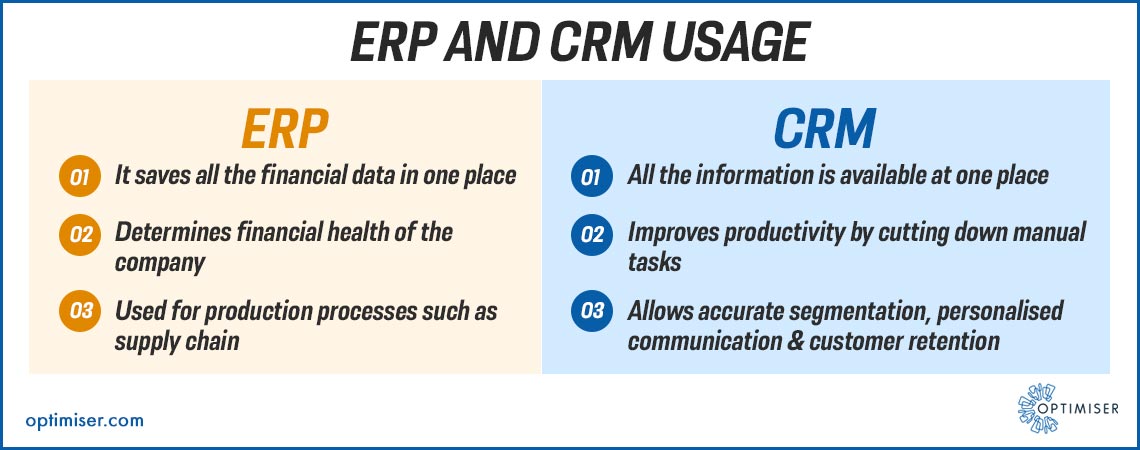
What is Customer Relationship Management (CRM)?
Customer Relationship Management is primarily used for relationship forging and retention with customers. But it can be so much more.
A well-rounded CRM can allow you to capture leads, qualify leads, engage with them, follow up, track the data visually, maintain prospect customers and update databases, and automate the sales and marketing activities.
At its full potential, this can save you time and money. In return, you will see increased productivity and more engagement with your employees as they do not have the menial tasks of updating excel sheets, filling out forms, or sending emails.
CRM software like Optimiser provides excellent sales, marketing and shop suites that allow you to seamlessly maintain excellent relationships with your customers and acquire new ones.
All of your sales and marketing activities are stored in one place. This enables you to provide a unified customer experience that can increase your ROI and customer retention.
Along with this, you can track projects and never miss a single deadline. Assign tasks to your team members and handle multiple projects at once.
Why Opt for CRM?
1: Customer information Transparency
All of the customer information is collated in one place. Their contact details, location, company, social media profile, engagement rate with business, etc., on one platform. The sales process of turning a prospect into a customer is visible with a single click. It allows all the team members to access the data wherever and whenever they wish. They can solve any problems/ queries of the customer without waiting to receive data from respective departments.
2: Productivity
Sales and managers have to manage a lot of administrative data. Previously this was done manually by them, which put more pressure on them. The intuitive automation within the CRM system will do routine tasks like sending reminder/ promotional emails, setting up reminders, updating the databases, etc.
In their free time, sales team members can collaborate with the marketing team and create an integrated strategy that allows the departments to align. The alignment of the marketing and sales team has proven itself to be incredibly beneficial for an organisation's growth.
3: Segmentation, Customer Experience and Improved Communication
CRM is effective for businesses, no doubt about it. Studies show that companies that use CRM have seen an increase in sales, revenue and customer retention rate. By collecting data that allows you to segment your audience better and creating more effective marketing campaigns, CRM can help you grow your business rapidly.
Communication using CRM is hyper-personalised which provides the customer with the best customer experience. Once you know what your customer expects of you, you will anticipate their needs better. And the more advantageous part of it is you do not have to spend time sorting them out; the CRM software will do it for you!
The Big Difference: ERP Versus CRM
Choosing between ERP and CRM can be tough. One is more financially concerned, i.e., ERP, and the other is customer-centric, i.e., CRM. Prioritising both is significant as they are the roots of your business. While watching the company's financial growth is really important, retaining old customers and acquiring new ones is also essential.
So, what are the major differences between the two systems that can narrow down your choices?
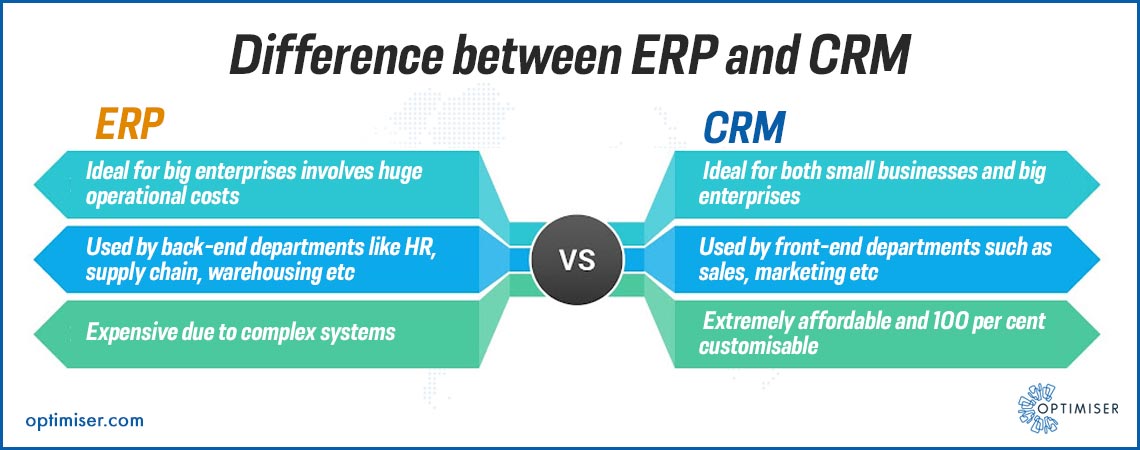
1: Use
ERP is cost-oriented. It is ideal for big enterprises that are looking for an alternative to cut out huge operational costs. As mentioned before, ERP oversees the production process and allows you to smoothen it with real-life performance reports. Established companies use ERP to generate steady profits and save money during the production stage.
CRM, on the other hand, is a tad bit more evolved. It runs both sales and marketing and even helps with project management. It allows you to gain insight into the customer spending habits and learn more about prospects to turn them into paying customers. Henceforth, CRM is more profit-oriented.
2: Matter of Departments
Back-end functions like Finance, manufacturing, supply chain, HR, warehouse management, and order processing departments are likely to benefit from ERP.
Whereas CRM can be used by front-end departments like inbound and outbound sales, pre-sales, marketing, customer success teams. Not only that, CRM such as Optimiser can be used by other department members for easy access to information, one platform data storage and management of tasks and deadlines.
3: Budget
ERP tends to be complex and caters to several departments. This is why it is slightly more expensive than CRM.
The market for CRM software is highly competitive, and multiple companies have put forth their software for small to large businesses to choose from. CRMs tend to be more ideal and affordable options for businesses.
SUMMARY
Choosing between ERP and CRM depends upon your needs. Suppose you are looking to streamline your production process and handle financial information while saving costs. In that case, ERP might be something worth checking out. But if you plan for customer retention, marketing and sales alignment, profit elevation, and managing everything from a single platform, CRM is ideal for you.

30 days free trial. No credit card required
 One powerful platform
One powerful platform
 Simple to use
Simple to use
 Comprehensive
Comprehensive

